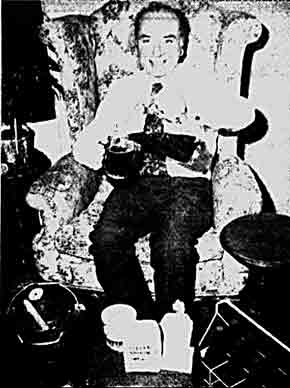Home-Brew.
Scottish Publicans worried over the increase of Home-Brewing.

Sid Young tries his home brew. 1979.
In the NEWS 1979...
Trouble Brewing, as the pub bosses go to war over the home brew.
You know the situation, you walk into a friend's house and he says, "How about a drink?" Short pause. "How about some of my own home brew?"
So if you've tried it you probably know the feeling too. Because what home-brewers make tends to have more punch in it than the drink you buy in pubs.
And that's worrying Scotland's publicans. So much so that the Scottish Licensed Trade Association is about to launch a campaign against the unsupervised sales in chemists' shops and supermarkets of do-it-yourself home brewing kits.
John Waterson, Glasgow publican who is convenor of the trade association's Abuse of Alcohol Committee, is the guiding light behind the campaign. "Get one thing clear from the start," he said uncompromisingly, "we know there will be squawks from all round that we're beefing because home-brewing is hitting our business, well, it isn't.
"I'm not getting into this to protect my pocket or anyone else's. I'm in because I'm worried.
20 GALLONS
"Last year around 5,000,000 home-brewing kits were sold in Britain. If you estimate a modest amount of 20 gallons per kit per year, that's a lot of brewing, something like 100,000,000 gallons.
"It's a £10,000,000 industry and it is producing a situation of uncontrollable booze. "A lot of home-brew beer is being produced in unhygienic conditions. "The net result is that young people in particular could be having access to a very potent drink, and here's one point where it does worry publicans in a trade sense, when these youngsters appear on the streets under the influence of drink, it could appear that our trade members could be accused of having served them."
What John Waterson and the SLTA will suggest is that legislation should be reintroduced to control home-brewing (there used to be legislation, but it was cancelled in 1963).
"The basic idea is that it should be licensed," he said, "If you buy a TV set you are registered as having done so, and you have to obtain a licence. The system I would like to see with regard to home-brewing is that you have to produce your licence before you can buy the materials.
"I think a reasonable sum for a licence would be £25. Not renewable every year or anything like that, just a once-and-for-all licence which would enable the serious home-brewer to buy his initial kit, and then all the bits and pieces required to carry on with what is, for many people, an absorbing hobby.
"But there are obviously far too many people who tackle it on s casual basis and who are equally casual about what they produce."
This casualness is another point worrying the publicans. Their fear is that in a house where there are innumerable bottles of home-brew lying about, it would be only too easy for children or teenagers to help themselves with nobody noticing.
SUPERVISION
The Scottish Health Education Unit, who have been publishing massive anti-drink campaigns, is also perturbed about the home-brew situation.
Said a spokesman: "In general, our position is to advocate moderation, not abstinence, but our worry is that with home-brew being so cheap to make, it is obviously more available, and the more drink is available, the more people drink.
"We are most concerned about the number of children getting access to alcohol because it is in the home in profusion, there is no legislation to stop youngsters drinking in the house.
" It all comes down to parental supervision in the end. But if that is lacking, it can be a big problem." A spokesman for Boots the Chemists, major retailers of home-brewing kits, Mr Ridley Thomson, said: "I think this business with the Scottish Licensed Trade Association is a load of nonsense.
"Making beer has been a rural hobby since the Doomsday Book was written. It is part of the country's traditional way of life and then along comes this association and say it should be licensed.
"Anyway, how could you licence beer-making when all a person needs to buy are some very simple constituents. You can't licence the sale of sugar, or of malt extracts, or of yeast. And you certainly cannot licence the supply of water.
"The whole thing is absurd. And it must be noted when young people are talking of, that you can't make beer in five minutes. It takes about seven days, and there are few families without enough parental control to control that."
IT'S ALL DOWN TO AN ART
Mr Sid Young, who lives in Melrose Avenue, Rutherglen, is an engineer to trade, and a home-brewer by inclination.
"People have made home-brewed beers and country wines for more than 6000 years," says Mr Young. "As for me, I've been making both since long before it became legal."
"The five-shilling licence of some years ago was nonsense, and I think any new proposal for a licence again would equally be nonsensical, an impractical attempt to clamp down on what is, in fact, a traditional art."
TASTE
Mr Young, who makes around 100 gallons of home-brew a year, proudly proclaims that his brew is better than the stuff you can buy over the counter, "And I'm never lacking any help to drink my brew," he said.
Dr Brian Wood is a lecturer in micro-biology at Strathclyde University and took his doctorate in subjects allied to brewing. He also makes his own beer for pleasure, and it was as a home brewer that he told us: "I fully understand the desire of the SLTA to protect themselves. A big part of the price of a pint of beer goes in taxation.
"I also share their concern over young people becoming involved but I don't see how this sort of law could be enforceable and it is simply a form of turning the clock back."
He added: "In the days before 1963, when home brewing became legal, there were no home kits available, but people made beer. Home brewing has even been de-criminalised' in American.
"I know of no evidence which proves that home brewing carried out in unhygienic circumstances could cause problems, hops in themselves have an antiseptic effect. As for beer being made for kick rather than taste. I have no idea of people's motivation but it's all a matter of personal taste.
"I simply think it is bad to have a law which would be impossible to put into action."
TAKE A TIP FROM FRANCE
Geoffrey Kirk, of Dennistoun, has been making beer for 12 years, and is also a member of CAMRA, the Campaign for Real Ale.
He said: "This matter has been brought up at a branch meeting of CAMRA, which is an enormous pressure group, and it is 100 per cent, certain that CAMRA will come out in favour of home brewing.
"The SLTA says it is concerned about hygiene. If there were any evidence of anyone catching anything but a hang-over from home brew, it would be a matter for the public health authorities, NOT the SLTA.
"They also say they are concerned about young people. There has never any proof or even any theories that young people become involved in alcoholism through buying home brew kits.
"It is far easier for them to obtain something over the counter from an off-licence that go through the process of making beer, even it they drink it at the vile stage during the fermenting.
"I started making beer when I came to Scotland because I didn't like the beer here. But like most people, after a couple of kits, I went on to specialise. Few buy beer kits regularly. They either give up or go on to specialist brewing.
TAXES
"That's why it would be impossible to introduce a licence. It has been estimated that an extra 300 staff would be needed to issue them, It's sheer economics and why the licence was dropped in 1963."
Alan MacDonald is a member of the Shawfield Wine Club. He says the SLTA proposals are: "Absolute nonsense." Alan, who lives in King's Park, Glasgow, said: "My friends come young and ask for my home brew rather than canned varieties. They prefer it for the body, not the alcohol content.
"I don't see why in a democratic country anyone should be stopping me producing beer. The Government isn't complaining (they have put taxes on brewing kits) so why should the SLTA?
"As for corrupting the young. In France they join their parents drinking wine at home. That's the right way to learn to drink, not under-age drinking in pubs."
End.
